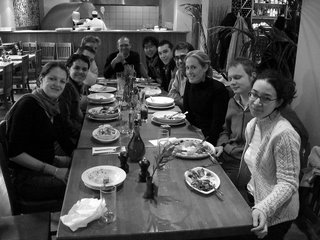
Along with a Strategic Studies meeting that was not particularly noteworthy, today included the last core seminar discussion in Hilary Term. It was about critical theory, which – along with normative theory – is definitely an area of the discipline for which I have some appreciation. I approve of the overt recognition of values. Also, it seems to be richer in unexpected insights into the function of the international system, perhaps because it’s an area we’ve generally examined less. I am thinking particularly of the connections between politics and economics and the role of elites as decision makers and framers of national and international discourses. At least, those are topics that caught my attention recently.
After the seminar, a contingent of students excluding the few who are presently sick with food poisoning in Germany went to a restaurant called Zizzi’s for lunch. I only had an appetizer, but found it to be surprisingly good. As always, it was fun to spend time with members of my program in a non-academic context. Partly because of how they are all in different colleges, it’s not a very frequent occurrence.
I really enjoyed working with Dr. Jennifer Welsh and Dr. David Williams this term. Dr. Williams was certainly an energetic contributor to our discussions, and I found Dr. Welsh’s comments to be quite insightful. Naturally, I also appreciated her tendency to use Canadian examples. Hopefully, I will have the chance to work with each of them again before the end of the program. To do so as a research assistant, over the course of the summer, would be particularly welcome.
I am a little bit nervous about my supervisor’s evaluation of me for this term, as he did not seem particularly keen on two of my essays. That said, we have a pair of essays left to discuss and I think they are fairly good ones. The first one is on whether “anarchy is what states make of it” as Alexander Wendt posits; the second is on whether order and justice are compatible in world politics. I hope we get the chance to go over each soon, despite how busy Dr. Hurrell seems to be at the moment.
The Trinity Term core seminar is on history from 1950 to present, with the same focus on diplomatic history as we had in Michaelmas Term. The seminar leaders for my group are Dr Alex Pravda and Dr Evelyn Goh, who taught the foreign policy analysis segment of our methods course. The group has also been switched around a great deal. I will be sorry to no longer be in the same group as Bryony, Robert, Emily, Shohei, and Keith. I will, however, be in the same group as both of my future roommates: Kai and Alex, as well as Claire, Matt, Roham, Sheena, Madgdy, Iason, and a number of others who I do not yet know well.
PS. There have been multiple snags on the housing front, both in terms of moving out of Wadham and moving into the flat on Church Walk. Hopefully, they will be resolved soon. If not, I will be in search, once again, of somewhere to live over the summer and for next year.
